ELVIS and the FLIPSIDE
ELVIS and the FLIPSIDE
Jennifer Shaffer and I have been meeting up weekly for seven years. The books that contain transcripts of our many chats are in BACKSTAGE PASS TO THE FLIPSIDE 1, 2, 3 or TUNING INTO THE AFTERLIFE.
Podcast: HackingTheAfterlife.com
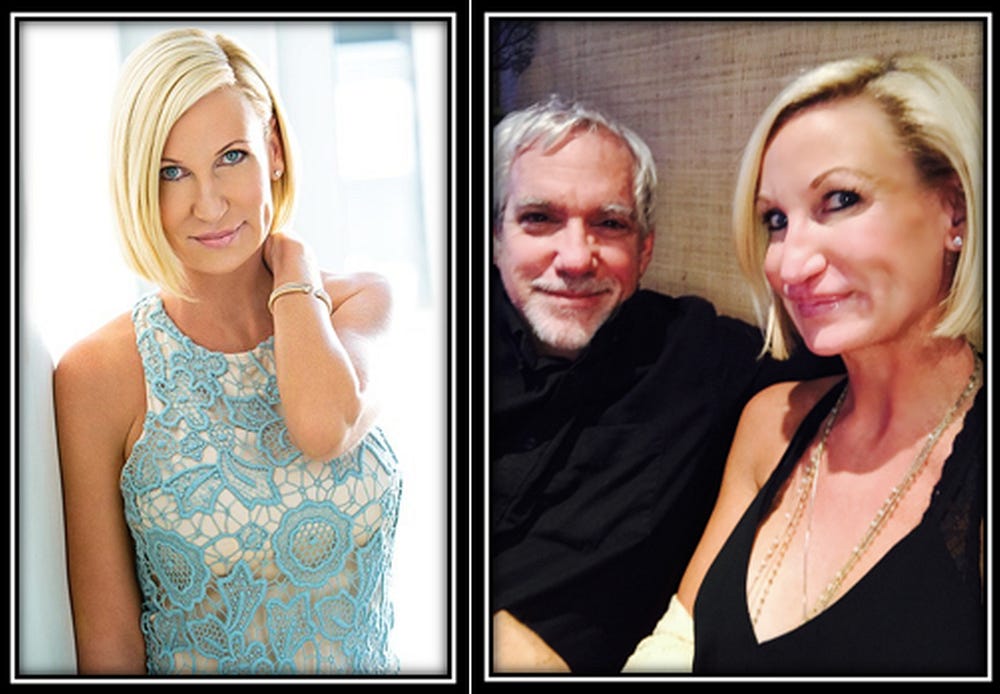
We’ve had Elvis show up in the past, and for the sake of clarity, and because the film is in theaters now, I’ve put together a number of times that he’s shown up in our chats. I was researching a film about Amelia Earhart and got invited to meet with a U.S. Marine veteran who served on Saipan, who saw her plane, was tasked with guarding it, and later watched it as it was destroyed. He lived off the Natchez Trail near Tupelo, Mississippi. I flew to Memphis, drove south to find him — promptly got lost, and pulled over to eyeball my cellphone map. When I looked up, I saw a giant sign in front of a shotgun style home in Tupelo.
“Birthplace of Elvis Presley.”
I wasn’t looking for it, but saw it. Years later, when working with renowned medium Jennifer Shaffer, who works with law enforcement nationwide on missing person cases, we began to interview people who showed up to chat with us. With the help of my friend Luana Anders, who passed in 1996, we’ve been interviewing dozens of individuals on the flipside. I joke that Jennifer is like having a cellphone to the flipside.
Either way, recently, Elvis has shown up in our podcast. There’s no other way to put it than after seven years of her saying weekly “so and so is here” — I then ask “so and so” why they showed up to speak with us. Because of the film coming out about his life, and because he had some things to say about it, I’m putting some of his interviews together in this document.
He first showed up in the research in a conversation about him. Jennifer Shaffer and I were discussing someone else’s crossing over — and when this musician got to the flipside, he said it was “as if he walked onstage and the band was waiting for him.”
He said they launched into the Carl Perkins tune “Blue Suede Shoes.” When asked “why that song?” the musician replied, “It was an homage to Elvis.”
Then in “Backstage Pass to the Flipside” book three, Elvis himself started showing up in sessions.
(Note: I was a music critic for Variety as well as a feature film director of 9 theatrical feature films. I’m a musician myself, son of a concert pianist and member of BMI since I’ve scored a number of my films. The book TUNING INTO THE AFTERLIFE is our latest collaboration — Jennifer and I chatting with musicians on the flipside. This first excerpt is from that book:
ELVIS STOPS BY
Jennifer: Elvis just stopped by.
Richard: That’s nice, we can get to him at some point…
James Brown wants to speak. He says “He chose this life to be an influencer, he influenced everyone to “knock it out of the park.” He gave them that “by being African American, by breaking the boundaries to do whatever they wanted to do. By giving everyone else an easier path to do whatever they wanted to do.”
That makes sense. Thank you. Does Elvis want to talk to us?
He does. He showed me Priscilla.
What about his daughter? Is he in touch with her?
He says “She’s hard to reach because of her disbelief.”
That’s okay, it’s allowed. Elvis, who was there to greet you when you crossed over?
He says, “His manager.” (Jennifer aside) That’s interesting. I don’t know anything about him.
I know who he is. Did he appear young or old when he saw him?
Middle aged.
(Note Colonel Tom Parker died January 1997 at age 87. Elvis died August 16th, 1977. When people appear on the flipside, they often report seeing pals as younger, thinner “with hair.”)
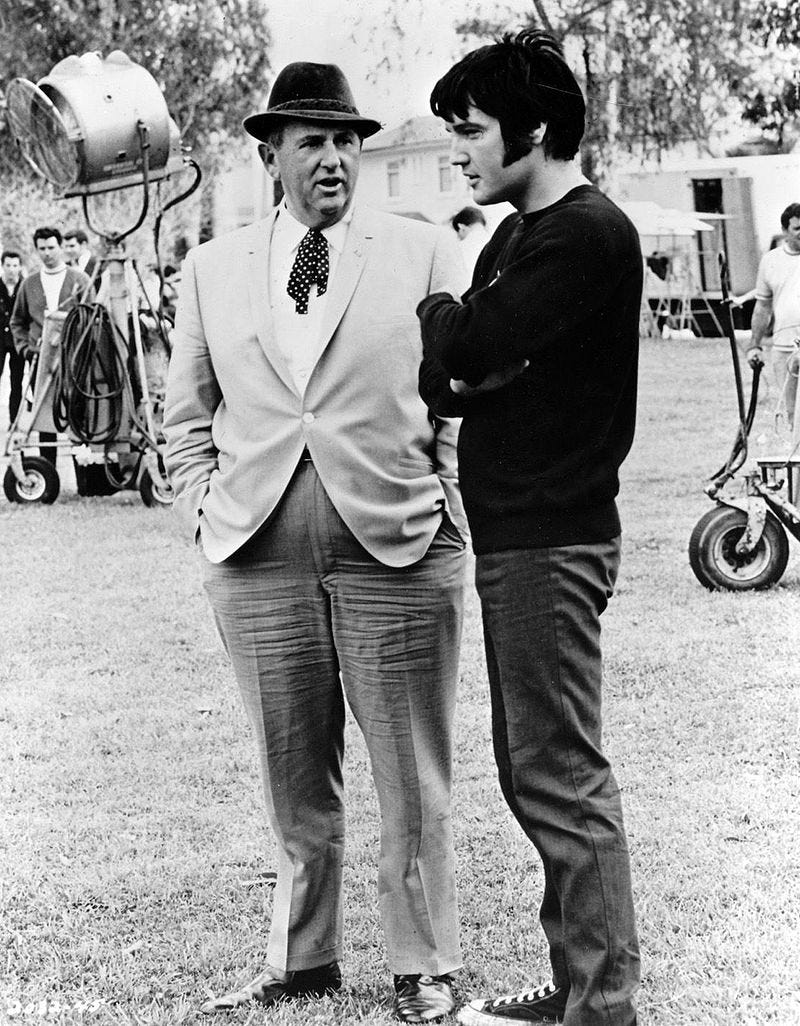
That must have been pretty unusual for you — you couldn’t get away from the guy in life and there he was to greet you on the flipside?
He says, “That’s how he knew he was no longer here, because he was greeted by him.”
Who else came to greet you?
He showed me five individuals.
Was your mother one of them? I know you were close; when did she come forward?
“She was right there with him.” (Jennifer aside) Was he tormented by the manager? I don’t know anything about him.
In life, yeah, but I imagine, not over there.
He’s showing me the man was like an equal with his mother…
Colonel Parker controlled his life…
I asked him if the manager apologized for his behavior and he said “No, but Elvis just understood why.”
Does Elvis have any regrets about checking out early? Or was this an exit point as in “time to go home?”
(Note We hear about “exit points” often — where people have a choice to “take the off ramp” but either don’t or stay around for some other reason.)
He said “He had two exit points before but he didn’t take them.”
Do you have any regrets?
(Jennifer listens) Aw.. he loved Priscilla. Says “His heart broken over losing Priscilla… he was so heart-broken over her.”
(Note When Jennifer says she doesn’t know anything about Elvis, I know that to be accurate.)
So when you first met Priscilla in life did you recognize her as your spiritual other?
“Yes. Instantly.”
From a previous lifetime?
“Yes, but he didn’t know it then.”
Did you have a relationship with her in a previous life?
“Many.” He’s showing me… It’s like they had opposite roles.
You mean like she a princess and you were a slave?
“Something like that.”
What about your musical ability? Where did that come from? Did you have that before?
He’s saying “Yes, a couple of times before. He wanted to understand what it was like to feel like everything was out of his control when he did music.”
Okay. Who was the most surprising person for you to run into on the flipside? Who impressed you over there?
He’s trying to show me … someone in a surf movie… He’s trying to show me a surf movie.
Someone you worked with in a surf movie? Someone who did a movie with you and you got back home and you met this person and that impressed you? okay I’ll look that one up.
(Note I figured he’d done many, but I think he’s referring to “Blue Hawaii.” His close friend on that movie was Robert West an “American actor, film stuntman and songwriter… known for being a close confidant (of) Elvis Presley. (Wikipedia) West died in 2017 at age 81, but according to these reports roughly two thirds of our conscious energy is always “back home” on the flipside. Sometimes people have a near death experience and see people who are still on the planet. So if Elvis ran into this friend, he would be surprised to see him as he was still alive.)
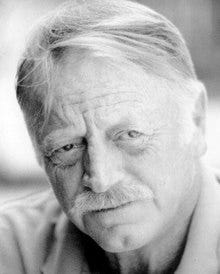
Thank you. Any last words for us Elvis?
He says “This is a great class.”
Anyone in our class want to speak? Luana, anything you want to say?
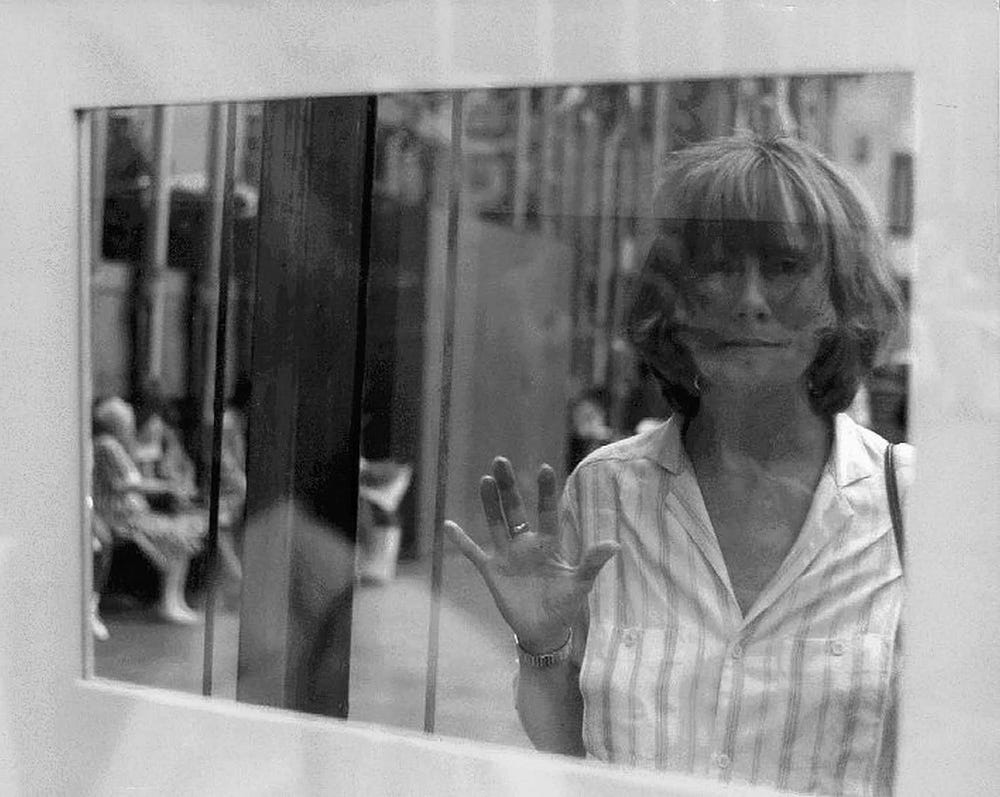
(Note: Luana is our moderator of this class. My friend of 20 years, she passed in 1996. She was an actress in over 300 TV shows and 30 feature films. LuanaAnders.com)
Luana’s voice is so calming and soothing, I love her voice… she’s saying “Everyone just has to be more open, and interpretations come in so many ways…
Well, the fact that his Manager controlled his life, wouldn’t let him travel, go anywhere, for Elvis to meet him on the other side… is kind of funny.
He’s saying “But he understood it.”
Interesting that he said he wanted a life where he was completely out of control. So that was perfect because the person who helped him get out of control was the guy who managed him — meaning he did a good job. Never thought I’d be rehabilitating Colonel Parker’s image in a flipside session.
“Right,” he’s saying, “That was the role he played.”
…………….
If I may; Luana didn’t know Elvis, but she did know others that have shown up in our class. James Brown showed up because he does know members of our class, and “Elvis” swung by because all of these people “vibrate” or “exist” in a similar frequency. But wait; there’s more.
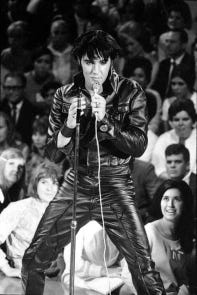
OUR PODCAST WITH ELVIS (HACKINGTHEAFTERLIFE.COM)
This is an edited transcript of the conversation between Jennifer Shaffer (in bold) and yours truly (italics).
Richard: Jennifer, it’s close to your birthday. What do you remember about your birthday when you were a kid?
Jennifer: I think it was around when Elvis died. (He died in August of 1997). I just remember I was being placed in a living room, my dad came back from a run, and we were watching the news.
Luana, is there anybody that needs to come forward that wants to talk to us?
(Jennifer makes a face.) It’s Elvis.
Well, well for people who are not familiar with our book Backstage Pass we have spoken with Elvis before. I know I asked him some of the some of the same questions, about his experience crossing over.
He just said “Blue Suede Shoes”… (Jennifer aside) I’m actually hearing the song which is kind of nutty. I’m not thinking it. (A pause) I think he’s making fun of me.
Well for the folks who haven’t read “Backstage Pass to the Flipside,” Elvis, who was there to greet you when you crossed over?
He said, “He recognized a child,” so I don’t know if he had a child… or Priscilla had a pregnancy that didn’t go right… um… but it felt like a child. I know that wasn’t the answer the last time.
(Note In the previous interview he mentioned his mother as one of the first to greet him; I was aware of their close relationship. In the book John Lennon talks about playing “Blue Suede Shoes” onstage on the flipside in honor of Elvis.)
It’s okay because the more we speak to people about the experience, the more people add to their story. He knows we’ve asked the question before.
Right, but I am still seeing somebody… I’m seeing a child and that’s what he wants to mention.
I see, so he’s here today to talk about this?
He says, “Yes, he’s trying to bring this point forward… which (he says) is especially for people that have lost a child before it came to term — for whatever reason.”
We’ve heard that often, people being greeted by a child and the experience of seeing that child.
(Note: In terms of people who’ve reported seeing a baby in our interviews; Harry Dean Stanton, who said aloud to eyewitnesses at his deathbed, “Hand me the baby” and in our interview with him, told us he was greeted by a baby that didn’t come to term, told us this a week before his memorial. Jimi Hendrix mentioned a child he was supposed to have but did not, and others have done the same, whether or not historians are aware of those miscarriages.)
(Jennifer aside) I believe in the thousands of readings I’ve given that before the spirit enters the body, they know what’s going to happen whether or not it’s going to be terminated, whether or not it’s going to be come to fruition or whether or not it’s there’s something wrong and they have a miscarriage.
Countless times; those children report even though they’re not born here they’re “born” over there. They get to help you with the other kids that are born later, they help facilitate that, so I believe he’s bringing that up… like “you still get to greet the loved ones that didn’t necessarily make it.”
A very interesting topic. And the reason you want to talk about it, sir, is because you want people to know the process?
He says, “Yes.”
In terms of this child that greeted you, was it a boy or girl?
He says, “It was a girl.”
Was this somebody you knew from a previous lifetime or is this somebody you knew from this one?
(Jennifer aside) I’m getting that it wasn’t with his wife Priscilla…
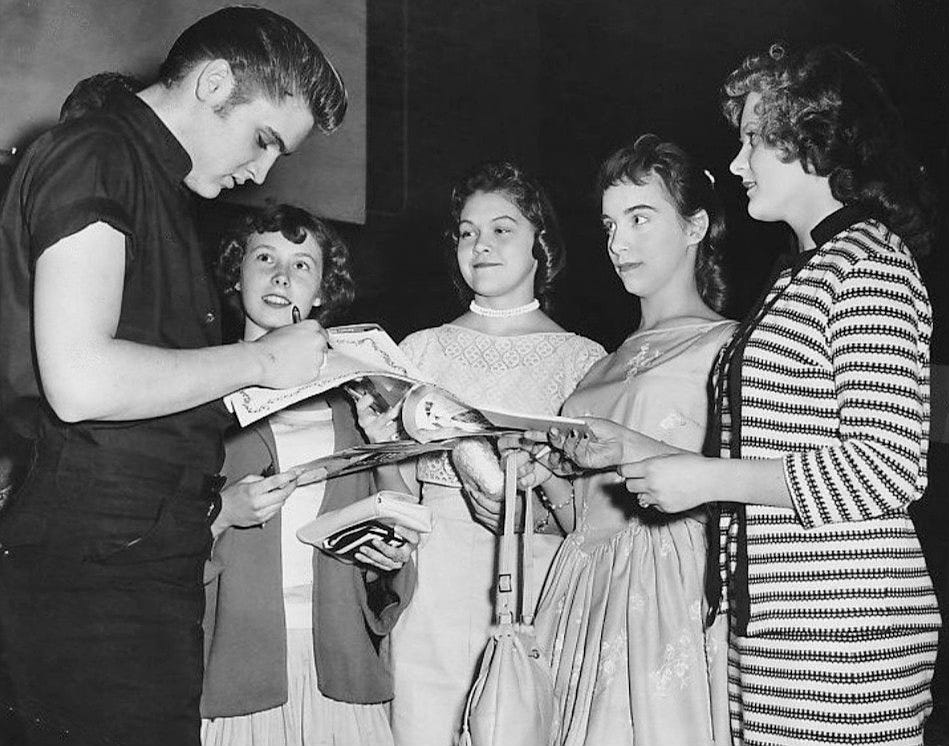 |
But was she somebody that was supposed to come to you in this lifetime or perhaps later on?
(Note; I wasn’t aware of his long term relationship with Ann Margaret — I don’t know if this was from that relationship, but I have read that she had a number of miscarriages in her life. I note it only because she came to mind when I was transcribing this session.)
No, it wasn’t something that’s supposed to come to me this lifetime, but I knew that this person or found out after the fact that this person didn’t have the baby…
So — it was somebody you might have had a baby with but didn’t arrive for whatever reason and so then when you recognize this being, are you seeing them as a small toddler, or are you seeing them just as light or as energy… or how do you see them?
That’s a great question because he showed me the process. He was showing me as he was coming to the other side… and he said, “You can only imagine how disgruntled I was at first (crossing over).”
He says, “But then all of a sudden my heart was just completely full of joy and (saw) that there were no mistakes that were made. That every one that was made… was supposed to be made…
It was all part of the journey that you had planned in advance?
He says, “I didn’t feel bad for anything… I was told that everything was exactly the way it was supposed to be.”
That’s beautifully put, thank you. Now just to point out that some people have a hard time with this because of course first their brain freezes when you say your name Elvis, because they can’t get past the fact that we are people who didn’t know you.
And he just set Prince in front of him… (as if because Prince is someone we’ve chatted with before, using him as a prop)
Put him in front so we’d realize we could talk to you even though we don’t know you or didn’t invite you today to chat with us? As Carl Laemmle mentioned (in a previous podcast) who passed in , he was someone neither of us had a connection to yet wanted to have a conversation.
Carl’s point was that he wanted to participate in our podcast, wanted to share something. It wasn’t like we asked him to speak and in this case it’s identical…. So, Elvis Aaron Presley, I have been to your birthplace in Tupelo Mississippi, as I just happened to get lost there, and stopped in front of your home while looking at the map.
Is that what you want to come and talk about? The process of incarnation or do you want to talk about music a little bit?
He said, “Thank you,” and he says, “No. He wants to speak about the process.” He said, “I know that would have helped me if I was to hear (about) that before I left the planet.”
I see, the information we’re discussing resonates with people on some level?
“Whether you believe it or not, it will resonate with some part of your being.”
There’s also this idea that we have a higher self that is aware of what we’re doing or watching us on stage and watching our podcast in in the midst of their disbelief allows their higher self to hear an alternate reality. They things that happen on stage are not set in stone, but often improvised, is that correct?
He says, “Yes.” He’s showing me like, “Let’s say things were planned in your life; like having a child, getting married, your work being a singer,” he said. And he says “And then from that… he’s showing me a grid — so if you have things or points on the grid happening…” He says, “Then you have points behind and underneath that, which we believe are coincidences.” He says, “And then a thousand beneath that.”
He says, “There’s so much work that we’re not consciously aware of, to have those things happen, and there’s different ways to get to that point there’s different ways to get to wherever you’re supposed to go. To connect those dots.”
We sort of have a grid that we’ve laid out for ourselves but correct me if I’m wrong, sometimes you don’t connect the dots for whatever reason?
He says, “Correct. And that’s what you have to make up in your next life (if you miss the connection.)”
Let me ask about your life review… I’m sure with lots of friends, family, teachers… What was that like for you or what was your review like?
He says, “It was long, long, like a huge download with tons of information.”
Does everybody simultaneously get that information?
He says, “Yes.”
For the most part you felt…
“Joy,” he says. (Jennifer aside) I’m wondering if there is a better word other than joy…he said, “Love.”
He says “It’s like I felt love in my life, but I didn’t feel (this kind of) unconditional love… like he was loved by people, but he didn’t know the feeling of that unconditional love that you can have for someone else.
He says, “Everything was filled to the brim.” He’s just showing me his heart completely filled, filled up with love, like there was not one space missing.
He says, “And (the life review) it’s like revisiting all the most amazing things from your life that fill up your heart.” He just showed me it was like examining all the major moments from his lifetime, whether they’re big, small or indifferent — he says, “Those accumulatively fill up your heart because everything else just kind of goes away.”
If I could just talk to you about process for a moment, the idea you’re onstage during a life review, and everyone in the auditorium experiences the ups and downs of your life. Is there an MC or someone who plays the role of the announce on “This is your life?” Is it your guide or a teacher?
(Jennifer makes a face.) He says it was Jimi Hendrix!
Really? Wow. Jimi has shown up so much when interviewing musicians on the flipside; it’s the weirdest, oddest thing. Are you joking because you’re aware of this class?
He says, “No!” He’s saying, “God is that big ball of energy of life that we make that we’re all a part of.” He says, “It is in everyone so it could be anyone that’s interviewing me it could be anyone doing this interview.”
But I’m asking, literally was it Jimi? Or a metaphorical Jimi?
He said, “It was (actually) Jimi, and that was part of his softer landing coming over to the afterlife.”
We can’t judge it as we’ve heard it so many times has to be as to not be fantastical for us.
(Note For those keeping score, Harry Dean Stanton saw Jimi at Monterey Pop festival in 1967 with Luana and Fred Roos, we reported how Jimi was there to greet John Lennon on stage when he crossed over, both played “Blue Suede Shoes” (the first mention of the tune in this research. When I asked, “What was he playing?” Jennifer said, “I’m seeing some blue shoes.” He clarified what kind of shoes, and how it was a song “everyone knew.”)
When speaking to my old pal Charles Grodin about what his experience was crossing over, he described an elaborate talk show. Jimi Hendrix was guest hosting the Tonight Show when Charles arrived on the flipside. We’ve asked Jimi about his journey, who greeted him on the flipside, and he’s said that he “likes to help other people transition so they can have a soft landing.” It’s like he’s saying, “Put me in coach, I can play that part and help them make the transition.”
Plus, this comment comes up again at the end of this article, both Jennifer and I had forgotten that Elvis said this. I mean literally both of us forgot about it.)
Elvis, if I can turn to Jimi for a second? We’ve interviewed you before (“Backstage Pass to the Flipside”) we talked about his journey…
(Jennifer puts up her hand) Hold on. (Jennifer asks Elvis) “Why are you showing me her?” (to me) I just saw someone who’s still on the planet, but they must not be doing well or something is going on with them.
Well let’s ask, Elvis, why did you put that image in Jennifer’s mind? Who is it?
It was Barbra Streisand.
I was writing about her yesterday (for this book)
Shut up.
I’m not shutting up. I was writing about her yesterday because my friend Kutenla had me give her a copy of a CD I made in Dharamsala with the Nechung Monks. But I gave it to James Brolin and said, “I directed you in a movie, but we’ve never met.” Film was “Cannes Man.” I took it over after shooting began… But the CD is the meditation that the Nechung Monks do to put the Oracle of Tibet into a trance.
If it’s a CD of prayers and chants, they’re saying “We need to pray…” or they’re saying something and they’re showing me… hold on a second.
Let’s ask Luana if they want to discuss chanting. She was a lifelong chanter, Buddhist SGI; does someone want to discuss the process of what that does for your frequencies?
He says “Yes! And about the frequency of getting more connected or feeling you are already connected but feeling more connected…”
We’ve had a number of people in our class mention this before, Anthony Bourdain.
They’re showing me chanting as well as church music. He says, “That’s important to help connect the two sides of the veil.”
Elvis you were from the gospel music, church singing world, what would be an avenue to connect?
As soon as you said gospel, he said “method.” Or “Methodist.” He says, “Put on some music as the method, if Gospel is in your background, then Gospel music (is too) If it’s what puts you into a trance, whatever music lifts your heart.”
(Note Elvis was baptized Pentecostal. While some argue Pentecostals and Methodists are the same, one is older than the other; both considered Protestant religions).
I was curious about how certainly frequencies are involved — like when we hear Elvis voice, or our favorite music, the sound is so distinct get hat frequency of who or what Elvis was or what he represented to us or the time in our life.
He says, “The same goes for other music, religious music, Christmas music — any kind of religious music where you’re in that space of family, of being loved. If it moves your heart whatever it is… (i.e.) it could be punk rock…” Tom Petty just showed me “Alice in Wonderland” so whatever that song was.
Alice in Wonderland? Movie or book?
(Note Tom appears to be referring to his song “Don’t Come Round Here No More” where the video was shot as if it was part of the Alice in Wonderland story — something I wasn’t aware of until I just searched “Tom Petty” and “Alice in Wonderland.” The song is about something completely different, but the video uses “Alice” as the backdrop.)
“Not the movie but the song,” Tom is saying.
I don’t know the song, but in the book, Alice takes a pill, she gets small, it’s an altered perspective. Are you saying that music changes your perspective, puts you into a holistic health trance?
He says, “Yes.” He’s saying “It can help heal you. Music helps to heal. It heals the soul; that in turn fills your body. It heals the soul… and that in turn heals your body.”
I just want to clarify something, Elvis. I’m trying to get to the heart of this. It sounds spiritual, but you’re talking about something science based?
He says, “Correct.”
The point being it’s it doesn’t matter what your belief system is, put on, crank up the tune if that elevates your heart. Crank it up? I read years ago about people treating all kinds of illness with sound therapy. It makes sense, since we are all vibrating atoms, if one can find the right frequency perhaps, they can restructure problem areas over time or with intensity. Correct me if I’m wrong Elvis, but you’re talking about the idea of the music elevating people — not only because it’s connecting to a happier time, but it’s also connecting you to your higher self?
He says, “Your future memories as well. Because if you play it live now but you could be helping yourself in the future when you hear it again.”
So, let’s say in a previous lifetime you were someone who liked Beethoven’s music? Maybe you heard him live, and then in another lifetime, you hear it again, and you connect to who you were when you heard it the first time? Tapping into who you were before?
“Yeah.” He says, “Yes.” He showed me an example. There’s a song that Coldplay sings, “Viva La Vida.” He showed me that song… the song has church bells ringing, Roman Catholic choirs sing “Nobody wants to hear me” — (Jennifer aside) I mean I’m hearing that song now, that song came into my head from somewhere, I wasn’t thinking about it, but Elvis says “A lot of musicians do that — they are remembering events from a previous lifetime. That Chris took the past of something that he was…” (Jennifer aside) I’m seeing it now, and connected to that past, and Elvis says “A lot of musicians do that… they don’t know consciously that they’re doing it (writing songs with impressions from a previous lifetime). Some do know consciously, and Chris Martin actually might but because they know when it’s just… kind of when it floats in your head… how to grab it.”
(Note A word about Viva La Vida. Lyrics are
“I used to rule the world, Seas would rise when I gave the word, Now in the morning, I sleep alone, Sweep the streets I used to own, I used to roll the dice, Feel the fear in my enemy’s eyes, Listen as the crowd would sing, Now the old king is dead! Long live the king! One minute I held the key, Next the walls were closed on me And I discovered that my castles stand, Upon pillars of salt and pillars of sand…”
For some reason I can’t explain, I know Saint Peter won’t call my name, Never rule this world, But that was when I ruled the world.” (Viva La Vida.” Words and Lyrics by Chris Martin.)
(Note It brings to mind George Patton’s poem “Through a Glass Darkly” where Patton recalls all of his previous lifetimes as a warrior.)
In this case, Elvis is referring to this particular song because Chris Martin may have had a memory from a previous lifetime. Perhaps as King, or someone who knew the King well enough to write about him. (And of course Elvis is often referred to as “King.”) What Elvis is saying is that musicians frequently write about previous lifetimes without knowing about it.)
Well, in your case Elvis, you didn’t write songs, but you lived inside of them in a way that made people feel as if you were singing to them.
When you said that, he said “I would sleep with them.”
Do you mean emotionally? Literally?
He was just talking about the music, like holding on to the piece of paper (with the song written on it) and he would connect to it, yeah.
Let’s talk about “Blue Suede Shoes” you popped that song into Jennifer’s mind. I know she’s not aware of who wrote that song but we’ve had a number of people reference that tune on the flipside.
(Jennifer aside) My dad loved that song and I forgot about that too! He’s saying, “Take all of the nuances of this podcast, the underlying threads dealing with my dad, it’s completely packed full of signs.”
So, (Jennifer’s dad, Jim) what is it about this Carl Perkin’s tune that connects so many people?
My dad just said, “It’s so much fun! It reminds him of his convertible when he used to race cars.” (Jennifer aside) I just want to clarify that I, Jennifer haven’t seen a blue suede shoe in my life.
Well, when we first talked to Jimi, when Jimi crossed over at some point, he was on stage playing that tune. Later we talked to John Lennon and when he crossed over, he found himself on stage with Jimi playing that song. Later I discovered they’d both recorded the song a year apart, separately.
(Jennifer aside) That’s crazy and now here is Elvis talking about blue suede shoes!
It was one of Elvis signature tunes, breakout hit.
(Jennifer aside) Yeah, but I’ve never heard him sing in spirit! That was really cool to literally hear him.
So, Mr. Presley, what’s up with the song?
He says, “It’s a song that connects generations.”
Elvis, have you talked to Carl Perkins? I assume he’s on the flipside (Note Carl passed in ).
He says, “He’s still writing away. He’s still writing away.”
Have you performed any of new songs on the flipside? How does that work? We had Carl Laemmle tell us a few weeks ago that people can create all kinds of vistas, including auditoriums or shows. Is it like that?
He’s showing me it’s like somebody coming up and saying, “Hey I want you to check out my arena that I built (with my mind). Will you come play in my arena?” That’s what he’s saying.
Somebody has mentally constructed an arena which means all the seats, all the acoustics — everything that you could possibly imagine?
I asked, “Do they try to recreate your experiences that you’ve already had?” He said, “Both. They try to recreate both; the experience of being on stage and the roar of the crowd, plus the backstage, minus the drugs and alcohol.”
Yes, we’ve heard that — no brains to get addled by drugs and alcohol. But then when you walk on stage?
He said “Being on stage, it’s like being on acid or LSD, but it’s not because you’re more euphoric. Because there’s such great pleasure associated with it, right?
And you don’t take for granted anything. Elvis says, “I would walk in, and before, I might have taken for granted the stage, the floor.” He says, “When you walk into something that was built or reconstructed,” he says, “You pay attention to every detail because you don’t want to miss anything!”
(Jennifer aside) “Wow. I don’t have the words. He just showed me when he was drinking and was on pain pills… He said “I didn’t have the wherewithal to appreciate the depth of what it took for that moment in time, because of course you’re trying to remember the lyrics, you’re trying to remember the cues, trying to remember the rehearsal… almost sleepwalking — which is not cool…”
So those frequencies … the frequency of your memory of you performing the song, the frequency of the person who wrote the song, perhaps the frequency of all the musicians who played with you, your sidemen and everyone that’s ever loved that song filling up the experience…
I’m sure the downbeat reverberates out across the universe and gets a lot of people to show up in the auditorium once they hear “Elvis is going to sing!” That must be thrilling for a lot of people.
He says, “Yeah because you can attract a crowd of people from different countries at the same time. All can come see him all at once.”
So, let’s pretend I’m in your audience… my higher self is watching you and my stage self is on stage… that guy’s not aware of the concert unless I’m asleep and then the filters are down. When I wake up, I might have a memory, “I dreamed I saw Elvis last night.” Is that how it goes?
He says, “Yeah. But he says it’s like being able to watch it on TV and then jumping into the television set.”
Cool! That’s a beautiful example; jumping into the television.
He says, “And you’re playing along with you don’t have to wait. No one is there to tell you not to jump in, but there’s a reverence for it and nobody will go that doesn’t have that frequency.”
You can’t force people into the audience right to join you onstage?
“Right,” he says.
So Luana, how did Elvis elbow his way onto your VIP list today? Does everybody just back up when he shows up?
She says, “It started yesterday with you writing about Barbra Streisand.”
Okay, I was connecting the dots to seeing her a few times, at the Clinton Inaugural, in a diner in Beverly Hills, then with Kutenla, the Oracle of Tibet.
(Jennifer aside) And I didn’t know anything, like I was fighting saying her name, but they were like saying “No, no, no it’s important. Tell him.” It shows how interpretation can be wrong — I immediately thought they were showing Barbra as some kind of health warning, but it turns out it was so you could connect those dots. And then the idea of “Route 66” came to mind, just seeing that number, my dad’s favorite tune. Nine times out of ten they’re putting the thought in your head.
Thank you, Elvis, for the illuminating conversation. We’ll catch you out on Route 66!
(Note Elvis traveled a lot along Route 66. But no record of his singing that tune that I can find.)
*****
I’ve played the tune “Route 66” quite a bit. In honky tonks and dives, restaurants and mansions — from clubs in Mumbai (a blues bar in India!) to Monteverde Restaurant in Odeon Paris, where one night everyone in the restaurant stood and sang along, I’ve left a few skid marks on that tune.
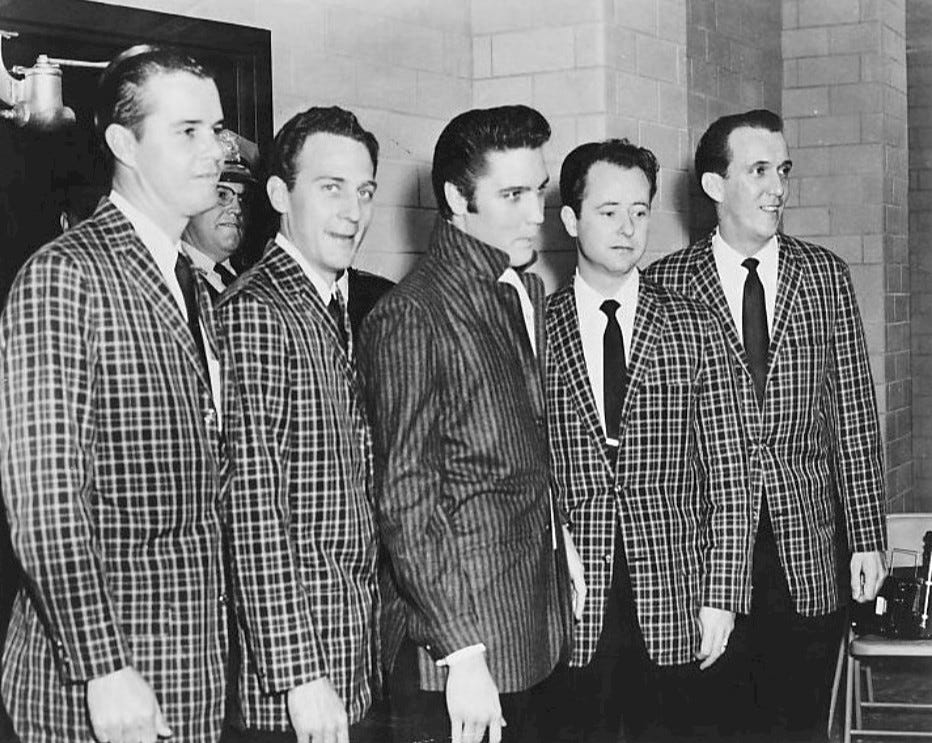
HACKING THE AFTERLIFE PODCAST WITH JENNIFER SHAFFER:
Richard: Hi. How are you? Oh, gosh, you know, this has been an exciting two week vacation. So have you been?
Jennifer: I just got Elvis Presley.
Okay, let’s not judge it. So, Luana (our moderator on the flipside) is that correct? Is Elvis on the top of your VIP list there? Does he want to come forward and talk to us?
Yeah, he wants to talk about your book and music. He wants to talk about the book TUNING INTO THE AFTERLIFE.
Well, so that is interesting. Elvis, I know, we know you’re standing in the wings here. What about the book?
To give context.
Elvis please. You have the floor.
He’s mentioning the eighth chapter of your book. So you have it right there.
I do. All right. Hello. (Picking up the book and going to Chapter Eight). Eighth chapter; it’s called. “We’ll be right back.”
(NOTE: This is unusual. Jennifer doesn’t have the book in front of her. For her to say “He’s referring to Chapter Eight.” I figured I’d reference it later. It began with an interview with the famous Dick Clark. Here’s an excerpt from the book (TUNING INTO THE AFTERLIFE, Homina publishing: pg 205)
I just got shown a photograph of Dick Clark.
Who showed that to you?
Luana.
Okay, Luana are you giving Jennifer a genre?
Yes — and she taps her nose, Luana’s way of signifying “on the nose.”
That you have a musical person for us to speak with?
“Like Elvis.”
(Note: I didn’t know that the 8th chapter mentioned him. But the chapter is a panoply of musicians that showed up, from Tom Petty to Frank Sinatra, George Harrison to Beatles producer George Martin, and the person I wanted to interview, Merv Griffin, because I was on the Merv show with Charles Grodin who introduced me as “the most charismatic person in the U.S. today.”)
Well, it is it is about somebody that we’ve interviewed before.
Because he’s making me think of the Beatles.
Yes, you’re correct. George Harrison is in Chapter Eight. There’s a conversation with George.
Okay, so give me a second. He says, “Everyone needs to find their voice he says everyone does find their voice. That is what unlocks you as a person as a spirit. That’s because when you find your voice, it trails with confidence. Everyone has a beautiful voice when they’re in alignment with who they are.”
Okay.
“Because when you’re not in alignment with who you who you are, you’re not understanding how great You could actually be.”
Do you mean “find your voice in terms of why you’re on the planet?”
He says, “What you want to do on the planet, and what your reason for showing up on the planet is, and now more than ever, and what to stop doing,” is what I’m getting. “Don’t do things because you have to do things but because you want to.”
Elvis, our friend. What else do you want to talk about?
He wanted to trigger what you just said about your voice, finding your voice. He says “It’s so important.” He said “During the last years of his life is when he didn’t. He didn’t feel he had a voice.” He’s still saying he was singing, but it’s almost like he lost that feeling for it. A lot of other things ended for him.
We’d like to know if his opinion of the movie about him that’s coming out soon. It hasn’t been released yet. Directed by Baz Luhrmann. Tom Hanks is in it.
I’m getting that “They were good friends” or somebody was a good friend with him that he knew. I felt like it was the person that Tom Hanks is playing.
I heard Tom reached out to somebody who knew Colonel Parker. And that person who was a friend helped him with his Parker characterization.
Okay, Elvis said that. He’s like, “(The movie) it’s very accurate until it’s not. It’s very Hollywood-ish” he says. But he also says, he also said “Because that was the good, bad and the ugly — and that needs to get out there.” And now he’s showing me the Kennedy family and what we’ve discussed with them — about the good, bad and ugly of their journey. Wasn’t there something that we’ve discussed about the Kennedys of dealing with Marilyn that actually just came out now?
Yes, that’s true. We talked to Marilyn, and asked her about her journey, and there is a new article about her in Vanity Fair where they talk about how she passed over and who was involved. It was pretty much note for note what she had told us, “that other people are involved.”
And Elvis says “The truth does set you free from here or there and from everywhere.”
Yes, thank you, Elvis, we’ve heard that; it makes sense.
He says “It makes everything easy.” But what else is very interesting, he says “There are days where I feel like time, well, because I’m in uh… I’m in both worlds at once, where I feel like time does not exist.”
And we’ve talked about the essence, the essence of who you are (and how that) gets carried through to the afterlife, where you get to work on yourself, they’re here, you get to work on yourself everywhere. This is just like we’re in a classroom, they’re in a classroom, like they’re learning on the other side, how to communicate with us, and vice versa, becoming of a blended family with the flip side. And the more people understand how normal it is, the more that they’re going to be able to realize that it’s not just in their mind, their mind, your mind is there to protect you remember that?
I understand. It’s the idea that filters that block us this information from us that’s there to protect you.
Maybe there’s too much because he just mentioned AI, artificial intelligence.
Artificial intelligence with one’s mind? I mean, if you think about what he’s saying, which is fascinating, because you’re learning on the flipside, and people aren’t aware of that (while on the planet). We’ve talked a little bit about classes and classrooms. So Elvis, are you taking any classes on the flipside?
He says, “No.” Hold on a second. He says, “He’s helping teaching classes over there. The class is called “How to Find Your Voice.”
Ah, so you’re more of a teacher?
He says, “Right, and what happens when you lose it.”
What happens when you lose your voice?
He says, “Voice coincides with spirit. So frequency; it’s the frequency of your spirit. So if you are, if you don’t have your voice, you shut yourself off or you shut down like you’re not able to be your spirit. You’re not able to find your full self to be fully spirited.”
We did have a similar conversation with Prince. We asked him about why he chose a lifetime that had so much of a voice and he told us about a lifetime previous to this one where he didn’t. Now I want to ask Prince a question. A couple days ago, a news reporter in Minneapolis found footage of you at the age of like nine or ten years old. There was a teacher strike, and they interviewed you on camera. I’m just curious what your thoughts about that
He says it was fantastic. He said he had those eyes as you did when he was like 10 years old. He said “He was an old man and a little suit.”
He was. You haven’t seen the footage of Prince, Jennifer?
(Jennifer aside) No.
It’s Prince as an old man and a little suit talking about teachers going on strike and how they have rights and there’s no reason for them not to strike.
Prince says, “He had compassion and sympathy and he totally understood (the reasons why) even though he didn’t understand.”
Very good. And of course, you have spoken a little bit about frequency. I mean, you’ve spoken a lot to us about frequency and about what Elvis was just saying, something about finding your voice?
“Absolutely,” he says. “A (person’s) voice represents everything,” is what he’s showing me.
So what do you mean by voice?
He says, “It’s you giving your spirit, a voice of who you are. So instead of just ‘blah, blah, blah’ I’m giving my spirit, a voice.” I do it sometimes, when I’m in my passion, when I have my kindness, compassion, love, when I don’t have projections, or when I’m not judging myself for others. It’s like you can’t judge others and have a voice with your Spirit, because your spirit wouldn’t do that.
With regard to the book Tuning into the Afterlife, singing, performing playing frequency, string theory, Pythagoras; all of it. That’s all related to your voice. Correct?
He says “Right.” Prince says, “AKA, your spiritual gangster side of yourself. Yes.”
“Spiritual gangster? Good name for a new record or a book. So Prince, people will ask, we’ve talked to you about this before, but are you still…
(Note: I didn’t finish the question, but Prince answers it before I can ask; “Are you still performing?”)
He said “Yes.” But he just showed me that you can’t perform unless if you have failure. They just showed me like one of the things I feared the most (as a medium) was getting in front of an audience and just reporting what comes in. And I forced myself to do it every single week until I was comfortable with it. Now, it’s super fun for me, and I love it. He’s saying “Fear is one of the things that stops you. You’re not in your, you don’t have that voice per se for your spirit. Because, if you have fear you’re shutting down, and you’re getting back into your head.” Like, “Oh, I can’t do it!” Your mind chatters, “I can’t do it.”
Which of course, meditation can help.
He says, “Meditation works. It’s an amazing thing for you. You’ll know when you’ve succeeded in blending your spirit and your voice because nothing else can stop you from what you do. Only you can. Granted, we need to make a living, we need to do this, we need to do that. But if you keep doing the things that you’re supposed to do with your work or with who you are, things are going to show up. It just might not look the way you wanted it to. Like you Richard, writing those eight books about this topic that you never wanted to do.”
Well, yeah, it’s kind of odd, because, you know, I find myself in the midst of writing them and then thinking, what was I thinking? Where did this come from?
But what’s great though about this, we might be, you know, we might be Vincent van Gogh when we leave the planet. We didn’t have success now, but later on, from the flipside, we’ll be like, “Oh my gosh, we had it. And now they get it! What we were talking about!”
I remember when we first started talking to Luana, I would ask her some questions about career advice. The word always came back to me as “focus.” And I remember thinking to myself, “Oh, she means focus on one of your films instead of ten.” And then it was like, “Well, which one should I focus on?”
I realize now, she’s talking about a lens; “bring everything into focus.” So what is the theme of your life? The thing that you’re trying to focus on? Bring it into focus. So if it’s talking to people on the other side, if it’s helping people like yourself, talk to people on the other side, whatever that is sharing research. That’s the focus she’s talking about. Luana, do you want to weigh in on that if I got that completely wrong?
She says, “No.” But she says, “She wants to say it in a different way.” She says “You are right.” She’s kidding, she says she wants to “dumb it down.” She says, “We just can’t be so serious about ourselves. Because when you’re so serious, it doesn’t leave any room for the coincidences to happen for you to know or do something every day that you love to do. You just have to allow things to happen. And know that it’s not, they’re not going against you. You just have to go with it.”
(Jennifer aside) Charles Grodin is here: He said, “You have to fake it until you make it. Sometimes it takes a little while to believe in what you’re doing.” He showed me myself, how it took me a while to know that… Well, depends on who you ask whether I’m crazy or not, whether it was seeing things or not, or who I was talking to.”
Sure.
He’s showing me how it took me a while to understand it. And it gives yourself the right to do that. But don’t limit yourself. He just showed me how I call myself an “intuitive.” And part of that has to do with the fact that I didn’t want to push myself in a corner that I am only a medium or I’m only an intuitive.
I’m a medical intuitive, I’m an investigator, that covers everything. Charles says, “So try to like it when they say voice can be heard in so many different realms, literally. With your thoughts with your actions, with your intentions. Just keep a light heart,” he says, “if you feel like you have a heavy heart, you’re gonna feel it.”
Let me ask you Chuck, at the Oscars recently, they did a section about you and our pals Dean Stockwell and Sally Kellerman. In terms of memoriam stuff, I just wondered if it bugged you or any of you guys wanted to weigh in or if you cared about it, one way or the other?
He laughs, says “They don’t really care. It’s everybody has a different interpretation of how you grieve. Grieve and what you hold in your hearts is from their essence.” He says, “Like an ex-girlfriend of mine,” he’s laughing, “might not think that much of me.” But his wife does. He says, “It’s like whatever it is that you carry with you with that with each person is what we know about them. We know our true essence, we know who we are, yeah, in totality, not just the time that we were there.”
So we can sit there and laugh and think it was funny. He said, “There were a lot of boundaries that were opened up for this particular year.” He says, “We’re making more headway than not in our film industry, of allowing it to be more inclusive and with less exclusivity. But now he’s just showing me a movie. The one with Leo Di Caprio. (“Don’t Look Up.”) They had fun with the concept — didn’t take themselves too seriously. He says, “Think about all the fun actors that were in that movie, and how it was made on Netflix. None of those actors would have ever done that a few years ago.”
(Jennifer aside.) Amelia Earhart is here. She showed me Robert Thurman.
Oh, is that a reference to the talk I gave for Tibet House online? “The art of living and dying?” So what did you think of that talk?
She says they loved it. They were all like, you know, listening in on it. She said, we’re just like this. For those who don’t know, that’s great. You represented the flip side. So Well, it’d be hard to keep up with what you’ve told them.
Well, if I may, I did. I worked really hard on it. But let’s just say I had a two hour talk at the conference of living and dying.
She said “Everyone loved it over there, as well as here, but everyone got a lot out of it, about what we feel over here, as well.”
TUNING INTO THE AFTERLIFE BOOK
Amazon.com: Tuning into the Afterlife: How to Stay in Touch with the Flipside (Audible Audio Edition): Richard Martini…www.amazon.com
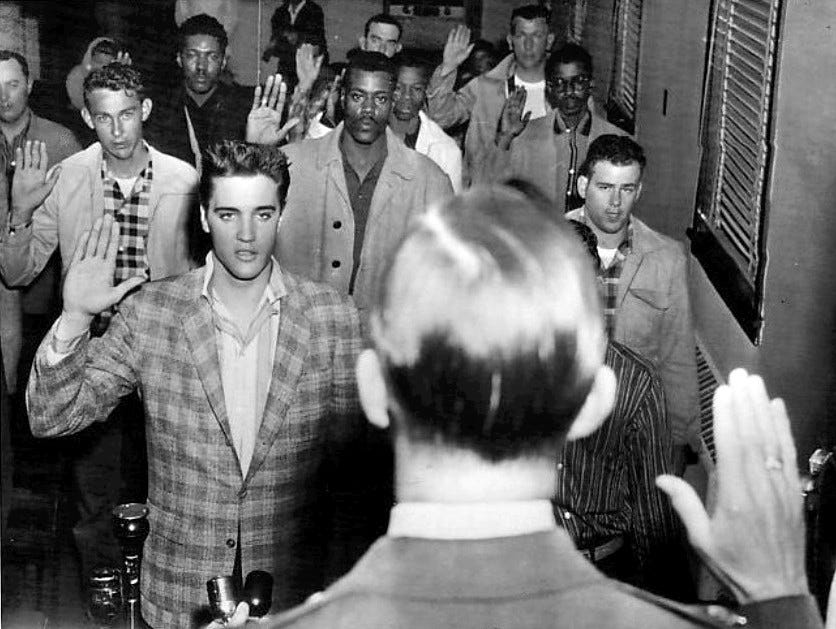
AFTER THE FILM PODCAST
RICHARD: I went to see a movie last night. Do you want and that if somebody that’s in our class, a movie about that about the hint, pretty big hint.
JENNIFER: Elvis?
(Note: This happens often. I think of someone I want to interview, and Jennifer says “they’re here.” Or names them. She has not seen the film “Elvis.”)
Yeah. So we talked to him a couple of weeks ago, we asked him about the movie. So does he want to talk about anything the movie or does he want to tell you exactly?
Hold on a second, there’s a bunch of chiming in. Aretha Franklin’s chiming in and is like, “same thing happened to him as it did for me.”
(Note: Aretha came through three times to talk about her handwritten will. I reached out to the executor of her estate at her request, who Aretha correctly identified as her niece. I sent the niece verbatim what Aretha told us; she replied “I talk to my mother on the other side often, I don’t think you’re speaking to my aunt.” I thanked her for the reply; it wasn’t our idea to reach out to her, it was her aunt’s, and she correctly predicted her handwritten will would be found in her niece’s home.)
In terms of storytelling it where they tell a story and they’ve recreated it, and created an ending to fit the story they created. It’s more of an opera and a little Citizen Kane thrown in. What’s your thought?
(Jennifer aside) I haven’t seen the movie.
Right. We have spoken to you before Elvis, about how Tom Parker, his manager, controlled his life, but how that they had a previous lifetime together where that relationship was switched. When Elvis first showed up, I wanted to ask him, “Why would you allow this guy to, you know, control your life?” And his answer was, “Well, I did it to him in a previous life.” So Elvis, I don’t know if you’ve watched the film Elvis… but of course, you lived the film, what are we talking about? But it your opinion about other characters in the film? Or maybe about the actor who played you?
He says, “The actor that played me said was amazing. He was it’s brilliant. Better than I was in real life.” (Jennifer aside) Did they have to put on a lots of makeup?
Well the character of Elvis wore makeup, but so did Tom Hanks. It’s like an opera, no question about it. And they made Parker the bad guy; you know, operas, the bad guy, the devil. It’s a little “Amadeus” in that regard.
He keeps showing me this. So like, “I had learned many things, so the essence of who he was, was not like how he was portrayed.”
(Note: Jennifer has not seen the film. For those who have, they know that it’s a bit over the top in places, but in others is about the metaphor of his life and journey. At the end they blend real footage with the actors in the film.)
But at the end of the film, they blended real footage of you, Elvis, and we can see how when you laugh, it comes from a genuine place. When you laughed, you’re somebody who has no ego. I don’t think any actor can recreate that.
(Jennifer aside.) He’s smiling. He says, “He liked how they portrayed his momma.”
They portrayed your mom very nicely. I thought they did a pretty good job.
He says his momma says, “She looks skinny.”
(Note: I try to report verbatim, in this case, it was said in present tense. Not “she looked skinny” but “she looks skinny.”)
Well, that’s sweet. I know that Priscilla is a big fan of the movie, because she’s mentioned it often.
He says, “She loves it…” He says, “It portrayed both of us (accurately) — the love that we had for each other. And why it didn’t work.” He says, “Because of him not being here. Like not being present. Right?”
Is there anything you might say to Priscilla, something only she would know?
He’s saying something … “She still has the original wedding ring.” Like something with that. (Jennifer aside) I’m sorry. Give me her first name again.
Priscilla.
They’re making fun of me with how much I get my hair cut. He says, “Write or say something about a ring or the ring.” He says, “It was an original ring that was handed down.” It felt like … okay, that’s funny.
From his family or her family?
I believe it was his mom’s.
His mom’s ring or her mom’s ring?
He says, “My mama’s.”
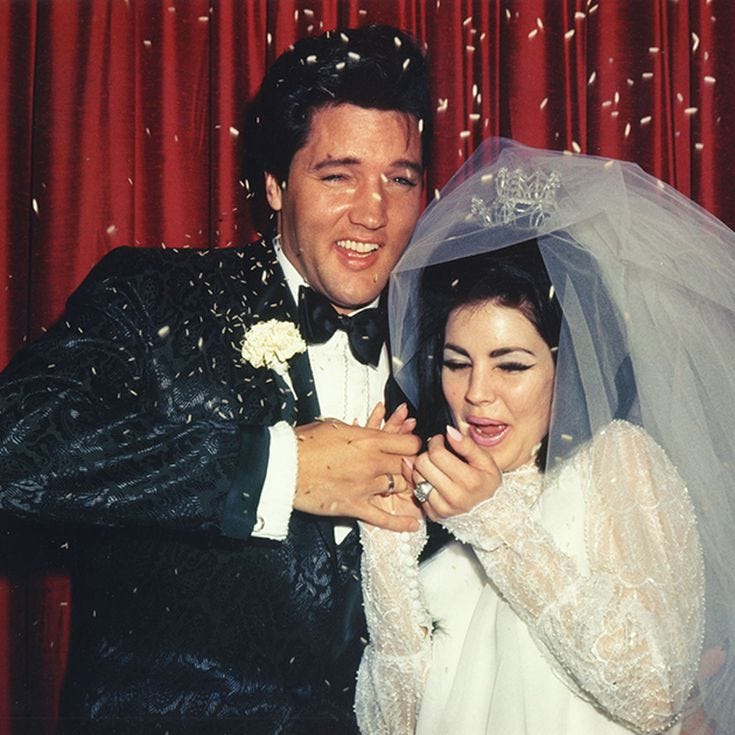
Something Priscilla would know, and we don’t have to look up. You know what I’m saying? Anything else you want to say to her?
He says, “She still hear him…” like, she “Still hears him singing, singing. It’s great.” Then I was shown Scientology.
Is she still a Scientologist? I don’t know.
(Jennifer aside) I don’t know either. (Showing Jennifer) They’re like “jump, jump, jump.” (Makes a gesture of jumping into other lives.) What I’m getting is that Priscilla already knows where a part of Elvis is reincarnated. Like, I feel like she knows in some way.
Wait a minute let’s ask him; you’re saying you’re back or what?
He says, “Part of his energy is back.”
Okay, well don’t tell us where, as I don’t want to disrupt anyone’s journey. But based on the research, after our incarnation onstage, we go back home.
We have different incarnations; we go back to the same soul — so think of the soul as the ocean. I’ve described this how each wave is a different lifetime but it’s happening all at once and then when we’re done we still keep our individual self. We go back to the soul or the consciousness of the soul. I’m getting like another form or another part of Elvis is in a different; is already reincarnated somewhere.
From what we’ve learned, we bring a portion of who we are, our conscious energy to a lifetime, and when the curtain falls, that portion returns home. Then we can recall all of our previous performances, all of our journeys together, and why this worked out. So I think what he’s trying to tell us, correct me if I’m wrong, what you’re saying is that she’s aware of this detail that there is his consciousness is also back home or elsewhere.
Unless he’s already decided to come back to some planet, or this planet, like we’ve learned with James Dean.
He’s just talking about there’s something (about reincarnation) that Priscilla knows is correct.
Thank you sir.
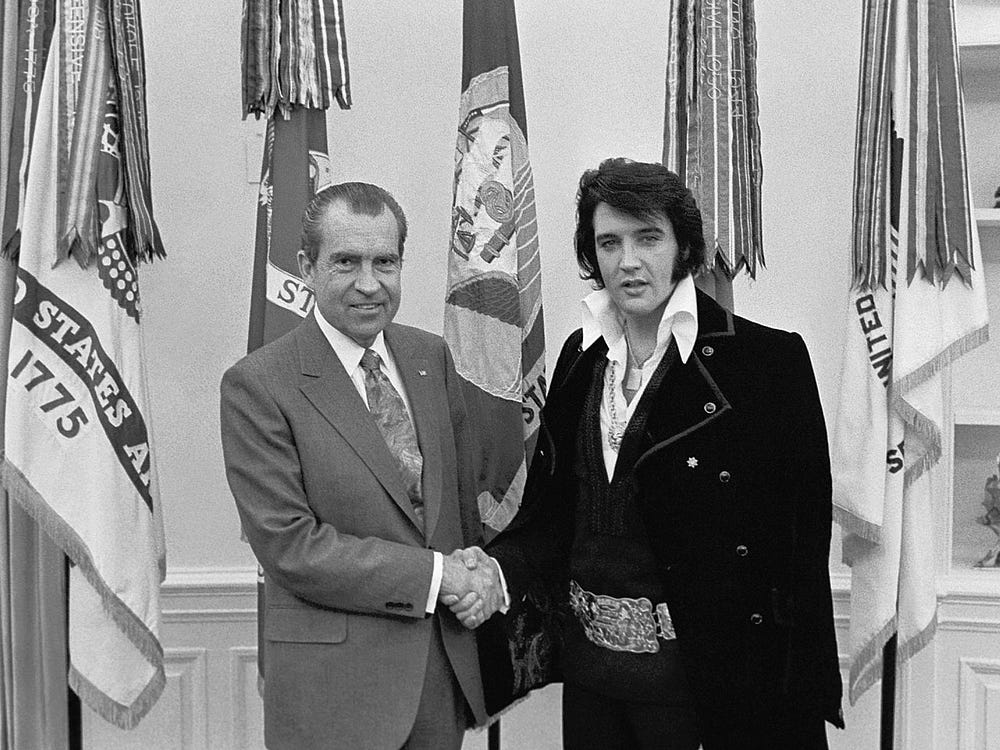
A RECENT PODCAST
Elvis stopped by during our podcast on 7–28–22 (with James Caan). He wanted to talk briefly about the process of incarnation, how people tend to choose lifetimes doing a task that they may have enjoyed in the past.
He said in his case that he could recall a lifetime in Europe where he sang classical music in the 18th century. It was the basis for his wanted to continue that in this lifetime.
Jennifer: (Luana) showed me Elvis but it’s not… she showed me the movie again. She showed me the ending. (Jennifer aside) Mind you, I have not seen it. I (still) haven’t seen it yet.
Richard: It’s allowed. So let’s just clarify. Does Elvis want to chat with about Elvis the movie? Or about himself?
Himself.
So let’s talk about this. Elvis. I’ve just recently become awareness that he was a guy who read was into a particular guru who taught about reincarnation. I didn’t know this about him, but somebody showed me books Priscilla said he read, was into. I can’t remember the name of the guru. (Note: It was Yogananda, (Autobiography of a Yogi” a person who taught meditation as a pathway and Vera Stanley Alder’s “Initiation of the World.”) Is this something he wants to talk about?
Yes. (Jennifer aside) That’s interesting. He says, “I did” and is the reason why he can understand now (about it). I was being shown not “I the person Elvis,” but the depiction of the person that was in the movie “Elvis.” That was the one that I was being shown, not the “Elvis” that’s over there. Almost like observing a past-life situation. It’s kind of showing something like that — “the past life memory of one’s journey.” He says “He was always fascinated by (the topic) because he knew some of the songs came from that from that same well.”
Well, of course, he was not writing the songs he sang, but I understand the point. He was connecting to them because they came from the same concepts. But let me ask Elvis, maybe you had a connection to the material as a singer, had you ever sung in a previous lifetime? Elvis let’s just ask you that.
(Note: In an earlier chat, he mentioned that he would “sleep” with the songs before performing them.)
He says, “Yeah.” (Jennifer aside) That was an unusual reaction.
Why?
Because I got some an image of Beethoven.
Well let’s unpack that. Do you mean from the classical era, like a singer, singer or a composer from that time period?
I’m getting that he was a singer, but he feels more female like.
Okay, that’s allowed. And so what kind of music were you singing? Was it popular, or was it more like opera, or classical music? Are we talking about opera and coloratura?
“Opera,” is what I received.
Okay so opera. What century are we talking about? Are we talking about Beethoven’s time like 18th century? Or 17th Century?
“1782 or around that time.”
Let’s just focus in on a part of Europe. I’m gonna guess it was in Europe where in Europe?
I don’t know, but he’s saying “Belgium.”
Brussels is in Belgium. And a long history of royal courts, royal singers. Was that who you were singing for? Private audiences or larger ones?
I felt like she “entertained the court.”
If you could, can you recall the name? The first name of this singer?
Begins with a C like Corrine.
You know, these are things I can look up Belgian singer seventeen hundreds. And your last name, if you don’t mind me asking. I mean, what was the name that they knew you buy?
It almost feels like Elsenich… E something.
(Note: In terms of music history, Belgium had its share of classical artists. Of this era, the most famous composer was André Grétry, (1741–1813) known for his comedic operas. His list of singers who worked with him is long, and his most famous opera is “Richard the Lionhearted” and the wikipedia entry has six sopranos listed (four are named, none are Corinne.)
It’s fun, sometimes you and I discuss a name and when I look it up and find it — it’s mind bending. So Corinne the singer who became Elvis in our era; why did you want to come forward and talk about that?
I just got shown how everybody’s feeling everything right now, from every different (level) you know, from every part of the veil, it’s like one big empath walking along the earth right now. The veil is disappearing and more people are feeling and connecting. And so a lot of times, your reactions to certain situations might not be from a current lifetime; they might be from the past.
So if you were somebody who used to perform, and you find yourself drawn to performance, that might apply to your journey or work? Are you saying that’s something to examine?
“Just ask about it, or go have a past life regression or use meditation like you do “— they’re showing me “go meet your counsel with you, Richard.”
Go have a council talk?
“Yes.”
I’ve finished my book on councils soon to be out there in the world, how everybody can talk to their council. They don’t need me. But thank you Elvis!
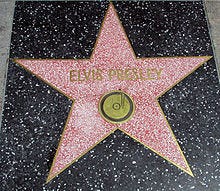
(After typing this, I got in the car and on came Elvis singing, “Walk A Mile in My Shoes” by Joe South:
“If I could be you, if you could be me, For just one hour. If we could find a way, to get inside each other’s mind, uh huh…
If you could see you through my eyes, instead of your ego, I believe you’d be, I believe you’d be
Surprised to see that you’ve been blind, uh huh…
Walk a mile in my shoes, just walk a mile in my shoes, and before you abuse, criticize and accuse
Just walk a mile in my shoes…”
In terms of what he’s saying here, is that if we can walk a mile in someone else’s shoes, we can understand why they made the choices they’ve made. Worth contemplating.
My two cents.
 |
For the latest podcast with James Caan:
TUNING INTO THE AFTERLIFE AUDIBLE BOOK








